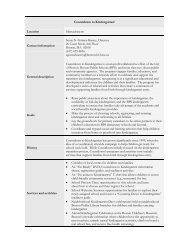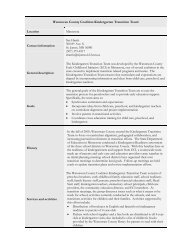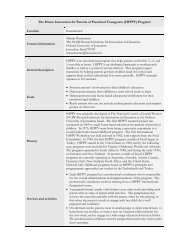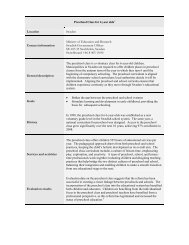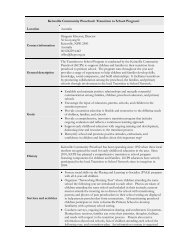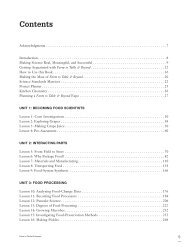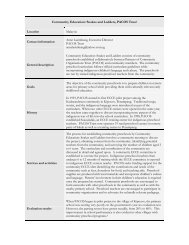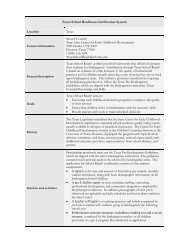Proceedings of the Fourth Annual Teachers College Educational ...
Proceedings of the Fourth Annual Teachers College Educational ...
Proceedings of the Fourth Annual Teachers College Educational ...
You also want an ePaper? Increase the reach of your titles
YUMPU automatically turns print PDFs into web optimized ePapers that Google loves.
This presentation will provide on a framework for examining <strong>the</strong> #phdchat community as a CoP, including<br />
<strong>the</strong> similarities and shortcomings <strong>of</strong> this comparison. I will also suggest a methodology for studying this<br />
online community, which includes discourse analysis and auto-ethnography.<br />
Examining how <strong>the</strong>se CoPs form and endure online is important because it helps us understand how to<br />
support and design for communities on <strong>the</strong> web, especially in education. In today’s educational climate,<br />
constraints are more than just 140 characters. Creating and supporting sustainable community-driven<br />
online learning environments can help students be confident and successful in <strong>the</strong>ir academic careers.<br />
References<br />
Anderson, L. (2006). Analytic autoethnography. Journal <strong>of</strong> Contemporary Ethnography, 35(4), 373-395.<br />
doi:10.1177/0891241605280449.<br />
Baym, N. K., & Markham, A. N. (2009). Introduction: Making smart choices on shifting ground. In A. N.<br />
Markham, & N. K. Baym (Eds.), Internet inquiry: Conversations about method (pp. vii-xix).<br />
Thousand Oaks, CA: Sage.<br />
Gee, J. P. (1999). An introduction to discourse analysis: Theory and method. New York: Routledge.<br />
Goldman, R. (2004). Video perspectivity meets wild and crazy teens: a design ethnography. Cambridge<br />
Journal <strong>of</strong> Education, 34(2), 157-178<br />
Hine, C. (2008). Virtual ethnography: Modes, varieties, affordances. In N. Fieldingm R. M. Lee, & G.<br />
Blank (Eds.), The sage handbook <strong>of</strong> online research methods (pp. 257-270). London: Sage.<br />
Hine, C. (2009). How can qualitative internet researchers define <strong>the</strong> boundaries <strong>of</strong> <strong>the</strong>ir projects? In A. N.<br />
Markham, & N. K. Baym (Eds.), Internet inquiry: Conversations about method (pp. 1-20).<br />
Thousand Oaks, CA: Sage.<br />
Lave, J., & Wenger, E. (1991). Situated learning: Legitimate peripheral participation. London: Cambridge<br />
University Press.<br />
Markham, A. N., & Baym, N. K. (Eds.). (2009). Internet inquiry: Conversations about method. Thousand<br />
Oaks, CA: Sage<br />
Papert, S. (1991). Situating constructionism. In S. Papert & I. Harel (Eds.), Constructionism (pp.1–11).<br />
Norwood, NJ: Ablex.<br />
Perkins, D. N. (1993). Person-plus: A distributed view <strong>of</strong> thinking and learning. In G. Salomon<br />
(Ed.),Distributed Cognitions: Psychological and educational considerations (pp.88-110).<br />
Cambridge, England: Cambridge University Press.<br />
Pea, R. D. (1993). Practices <strong>of</strong> distributed intelligence and designs for education. In G. Salomon<br />
(Ed.), Distributed cognitions: Psychological and educational considerations (pp. 47-87).<br />
Cambridge, England: Cambridge University Press.<br />
Rheingold, H. (1993) The Virtual Community: Homesteading on <strong>the</strong> Electronic Frontier. Reading, MA:<br />
Addison-Wesley.<br />
Salomon, G., Perkins, D. N., & Globerson, T. (1991). Partners in cognition: Extending human intelligence<br />
with intelligent technologies. <strong>Educational</strong> Researcher, 20(3), 2-9.<br />
Schuler, D. (1996) New Community Networks: Wired for Change. Reading, MA: Addison-Wesley.<br />
Stahl, G. (2002). Contributions to a <strong>the</strong>oretical framework for CSCL. In G. Stahl (Ed.), <strong>Proceedings</strong> <strong>of</strong><br />
CSCL 2002 (pp. 62–71). USA: Boulder.<br />
Vygotsky, L.S. (1978). Mind in society: The development <strong>of</strong> <strong>the</strong> higher psychological processes.<br />
Cambridge, MA: The Harvard University Press. (Originally published 1930, New York: Oxford<br />
University Press.)<br />
Vygotsky, L.S. (1986) Thought and language. Cambridge, MA: MIT Press<br />
63



